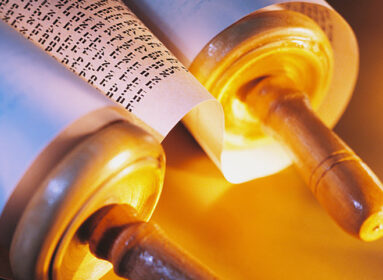
Vayechi
The captivating Book of Genesis reaches its climax with all the children of Jacob standing united around the deathbed of their father, waiting to hear from his lips the final blessing. This deathbed scene is the culmination of all the past Sturm und Drang, the rivalries and the rejections, the sacrifices and the successes, which went into the formation of an incipient God-enthused nation dedicated to the transmission of the message of ethical monotheism, a mission upon which hinges the very future of a world of peace, security and redemption. Jacob-Israel’s final will and testament, a bequest of edifying and prophetic words rather than of material objects or lands, contains an outline of the program and the goals which will inform this burgeoning family-nation as it begins to take center stage in the drama of world history.
What is a bit jarring, however, in this final scene, is that Jacob blesses his grandsons, Ephraim and Manasseh (Gen. 48), before he blesses his own children (Gen. 49). Why?
When Jacob blesses Joseph’s children, he insists upon placing his right hand over the head of the younger child, Ephraim, and his left hand over the head of the older boy, Manasseh. He then gives them a joint blessing, although clearly indicating that while the elder will attain greatness, the younger will be greater still, and his seed will encompass a multitude of nations (48:19).
The personalities and goals of each of Joseph’s sons are explained by the midrash cited by Rashi in his commentary. Manasseh served as Joseph’s interpreter and his right-hand man in his dealings with the many nations who flocked to Egypt to acquire grain (Gen. 42:23, Rashi ad loc). When the aged patriarch Jacob came to Egypt, Ephraim went to live with his grandfather, to learn from him and to tend to his needs; thus he was the one to inform his father that Jacob was ill (48:1). Manasseh was the linguist-politician, the competent economist who could handle world affairs; Ephraim was the devoted student of Torah whose life was dedicated to learning about the traditions of his ancestors.
Jacob placed his right hand – the bestowal of the birthright and religious leadership – on the head of Ephraim, and his left hand – the blessings of national prosperity – on the head of Manasseh. He recognized that each of these skills and vocations were important, and therefore he granted the individual blessings to each of them together, stipulating that in the future each Israelite be blessed with the joint blessings of Ephraim and Manasseh together (48:20), as parents bestow on their children every Friday night.
I believe that Jacob then had an epiphany! Just as he had not rejected the elder son in favor of the younger, but rather gave each his due, so perhaps his mother Rebekah may have been mistaken when she attempted to prevent Esau from receiving his father’s blessing. Perhaps although Isaac had wished to give a blessing to the more materialistic Esau, he had always reserved the birthright of religious leadership for his younger son Jacob. If this was the case, then Jacob could rest assured that his father had never rejected him completely; indeed he had recognized his spiritual strengths all along. The family never should have been split apart; why couldn’t two sons – and even 12 sons – each receive their own special gift, and cooperate with the other(s) for the ultimate good of the united nation?
Jacob’s newfound understanding, arising as it had from his experience of blessing his grandchildren, set the stage for the final and most significant act of his life, the blessings he bestowed upon his sons. In addition to the unique legacies he bequeathed to each head of a tribe, he bestowed the major material blessing – the double portion – upon Joseph, the beautiful and successful architect of the Egyptian economy and manager of international politics. And he bestowed the birthright, the mantle of the righteous and responsible ingatherer of a multitude of nations who will eventually bring ethical monotheism to the world, upon Judah, the sensitive unifier of the family.
The blessing and the birthright can go to two different brothers, without rejecting anyone, as long as the family is united and works together. Thus Patriarch Jacob paved the way for both the Messiah son of Joseph – who will reestablish a Jewish state with an economic structure, and a political system making Israel a nation amongst nations – as well as the Messiah son of Judah, who will rebuild the Temple and perfect the world in the Kingship of the Divine.
Rabbi Shlomo Riskin is chancellor of Ohr Torah Stone and chief rabbi of Efrat, Israel.








 Southern New England Jewish Ledger
Southern New England Jewish Ledger










